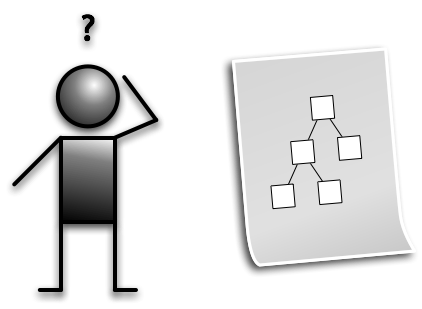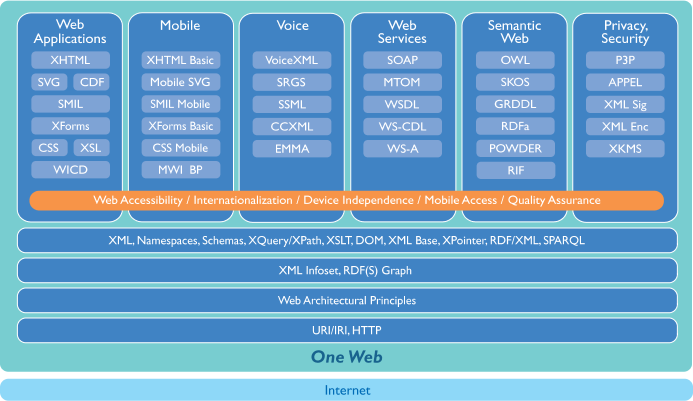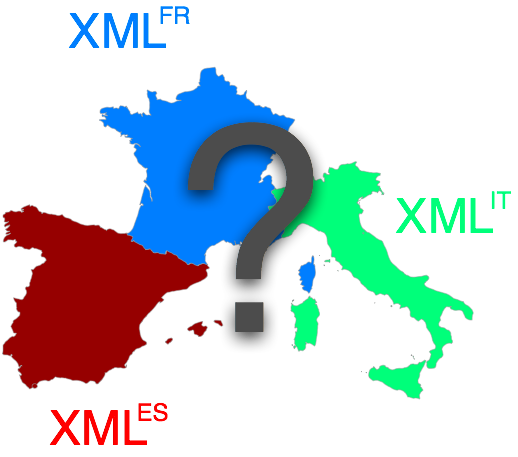Disclaimers
- Formal work has just started
- We don’t have the solutions!
- trying to identify the challenges
- Not yet the view of the Group
eGovernment at W3C
Activity to tackle issues in three main areas:
- Open Standards
- Participation and Transparency
- Data Integration
Open Standards: Big Picture

Organization vs. User

One stop shops

But...
- Example: get to a purchase order
- Click 2 javascript: links
- Go through 3 pop-up windows
- Finally, get to a URI like this:
https://www.example.com/PublicAccess/PA_POCheck.aspx?IdPurchase=YES&QS=ER4TEngVFRMXeBQSERIfHxQ=
Replay (with common sense)
- Example: get to a purchase order
- Click one regular link
- Get to a URI like this:
https://www.example.com/PurchaseOrders/2008/05/19/IDXXX
or
https://www.example.com/PurchaseOrders/IDXXX
Open Standards Policies
- Governments should not require people to purchase particular software
to access information
- Promote longevity of information
- Openness helps to maximize reuse of knowledge
- colleagues, departments, agencies, citizens, companies, other
governments, other partners
- Open standards promote research
... and then...
“application must be conformant with W3C standards”
What W3C offers

Open Standards: challenges
- What’s the best way to enable a given policy goal?
- What’s the right tool for the job?
- How should I use X plus Y?
- Suite of open standards to solve the Web-related issues
Participation and Transparency
Users are going away...
How do citizens search?
- They often use a search engine
- very few go to the one-stop shop
- even less to the given agency Web site
- They get a pointer to Wikipedia
(or similar)
- Happy with what they get
Not convinced yet?
- In a Google search of five keywords or phrases representing the top
five news stories of 2007, which will rank higher?
- Weblogs
- New York Times' Web site
Sophistication is there...

Benefits from eGovernment
projects at different levels of sophistication to a mid-size OECD country
Source: OECD
through The Economist
Organizational change is also a must!

We can no longer afford to work at the speed of government. We have
responsibilities to the public to move the information as quickly as
possible … so that they can make key decisions.
Brian Humphrey and
Ron Myers (LAFD)
P A R T I C I P A T I O N
- Yes, in upper case!
- Find ways to engage the users
- Change, Innovate
- if not, others will do it for you
(e.g. third party services)
Put the information where needed
Risky? challenging... fun!
- Reliable source of information?
- To mix or not mix
- What happens to the authoritative source of information that the
government is?
- ...but also
Transparency has many faces
- Accessible Web site
- Open Government Information
Granularity and Provenance
Avoid Obscurity by Default
Participation and Transparency Challenges
- Use collaborative tools
- balance risks
- design a contingency plan
- Identify provenance of information
- Release as much as possible
- balance with restrictions
Data Integration
Why XML is not always enough?

Linked Data
- Start simple
- RSS, Atom, Microformats, GRDDL, RDFa
- No need to throw away your existing systems, build on top
- Metadata are the goal (data mashups)
A Word of Advice
- Authoritative source
- Trust
- Provenance
- Security
- Integrity
Data Integration: challenges
Linked Data (maximize data integration and re-use)
- Increase metadata
- Roadmap for transitioning from existing systems
- Don’t throw away, build on top
- Metadata use policies
- Trust-related challenges
Mobile Phones

(Photo Source: NY Times
) |
- What services to prioritize? How? Where?
- Mobile Web for
Social Development
- W3C Goal: to make the Web accessible, relevant, usable and
useful for under-privileged populations and rural
communities
|
eGovernment at W3C
Improving access to government through better use of the Web
- Interest Group: forum for
discussion
- Collective effort
- Governments, Industry, Citizens, Civil Societies, other
International Bodies
- Identification and description of existing challenges and propose ways
to address them
- Three Task Forces: Usage of Web Standards, Transparency and
Participation and Seamless Integration of Data
- Outcome:
- Creation of an interdisciplinary forum
- Identification and documentation of challenges and propose
good practices to tackle them (Group Notes)
Removing the "e" from eGovernment
- Online services not just an alternative
- Becoming “the” public services
- More important than ever to solve problems









